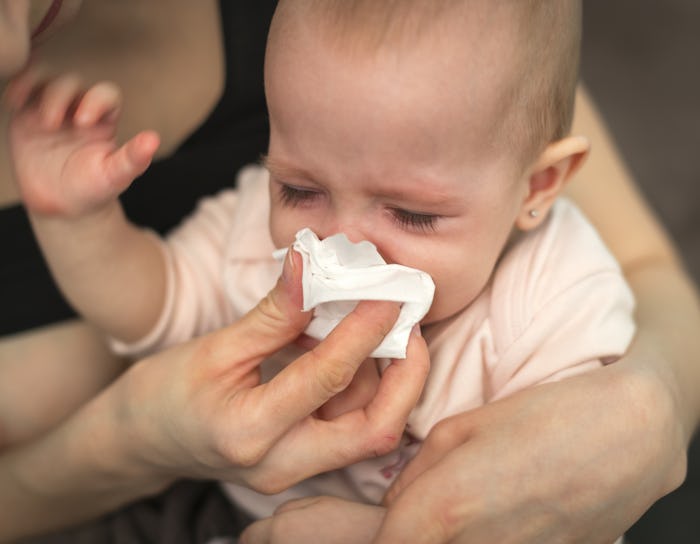Life

7 Signs Your Baby Has Seasonal Allergies, Because It's That Time Of Year
That first baby sneeze is the cutest, right? It's quite funny to see their little faces get all screwed up and that little "Achoo!" is so tiny. But what happens if those sneezes turn into something bigger? For instance, what is the difference between a sneeze that points to a baby who may be struggling with allergies, and when is a sneeze just a sneeze? Turns out there are signs your baby has seasonal allergies and they might not always be as obvious as you think.
Researchers estimate that up to 15 million Americans have food allergies, including 5.9 million children under age 18. That’s 1 in 13 children, or roughly two in every classroom, according to Food Allergy Research and Education (FARE). But experts say the good news is that it's uncommon for babies to suffer from allergies.
Still, you'll want to keep these pointers in mind as your little one grows. Whether you spot a funky rash on your baby's leg or you can't help but notice your little one sneezes each time they hang out with your cat, it's important to be able to decipher the difference between a sniffle and seasonal allergies. Here's the inside scoop.
1Keep An Eye Out For Eczema
"Seasonal allergy symptoms in babies typically will start at 6 months of age or later," Dr. Tania Elliott tells Romper in an email interview. "That’s because it takes at least six months to develop an allergy in the first place. So, the allergies that will develop are indoor allergies such as dust mite." Elliot says often times the first thing you'll notice will be eczema (atopic dermatitis), which typically occurs behind the knees and in the forearm creases.
2Consider Your Time Outdoors
"Outdoor allergies like pollen don’t typically occur within the first year of life because they haven’t gone through the season yet and haven’t spent enough time outdoors," Elliott says. Parents noted that it's unusual for a baby to be tested for pollen allergies, but an allergist can help you decide if a blood or skin prick test is in order. "A blood test involves withdrawing blood and measuring antibody levels toward certain allergens to see if the levels are high," the magazine noted.
3Look To Your Furry Family Members
Studies show that kids exposed to cats or dogs within the first 12 months of life are less likely to develop allergies to them, Elliott says. Year-round allergies to dust mites, mold, or a pet — as opposed to seasonal allergies — will present in the form of symptoms like itchy, watery eyes, a rash, a runny nose, sneezing, coughing, or wheezing indoors, according to BabyCenter. "The symptoms may even occur when your baby isn't in close contact with the animal, since the allergen can be found throughout the indoor environment," the website noted.
4Watch For Problem Foods
The most common type of allergy in babies is food, which can also present as bad eczema. "This is more common than the seasonal stuff," Elliott says. The most common food allergies in young children are milk, eggs, fish and shellfish, nuts, soy, and wheat, according to Everyday Health. "Symptoms of child or infant food allergies may include skin rashes, hives, wheezing, nasal congestion, and digestive problems," the website noted.
5Check In Around Toddlerhood
Everyday Health noted that by the time your baby reaches toddlerhood — around 18 months — you may see sensitivity to indoor and outdoor allergens show up. "Symptoms can include itchy nose and eyes, nasal congestion, coughing, sneezing, and asthma," according to the website.
6Let Siblings Set An Example
Turns out that older siblings might also be helpful in providing information about your little one's allergy potential. "If you're concerned about baby having allergies, especially if an older sibling already has them, you'll want to talk to your pediatrician and begin tracking symptoms," The Bump said. "If symptoms become disruptive or persistent, it's probably time to go to an allergist."
7Stop Allergies Before They Start
The good news? "The best way to prevent allergies in babies is early introduction, so that while the immune system is forming it learns what is normally occurring in the environment and what isn’t," Elliott says. So, don't be afraid to let your little one explore a bit.
Check out Romper's new video series, Bearing The Motherload, where disagreeing parents from different sides of an issue sit down with a mediator and talk about how to support (and not judge) each other’s parenting perspectives. New episodes air Mondays on Facebook.